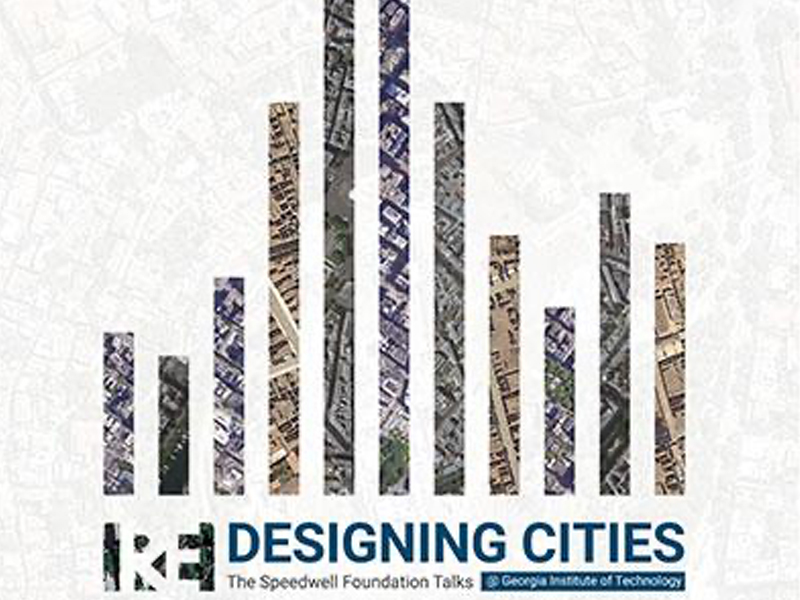Redesigning Cities Podcast Series Launches

Podcast Series "Redesigning Cities: The Speedwell Talks @ Georgia Tech" Officially Launches
April 18, 2019 | Atlanta, GA
The Georgia Institute of Technology School of Architecture in Atlanta, Georgia is pleased to announce the launch of videos and podcasts from its popular lecture series, REDESIGNING CITIES: The Speedwell Foundation Talks @ Georgia Tech. Through various topics, each lecture addresses issues in urban design by asking, "How should existing cities and their systems be redesigned to address 21st Century challenges?"
Ellen Dunham-Jones, Director of the Master of Science in Urban Design program, brings together a pair of leading experts to address specific challenges including equity, money, social capital, climate change, outdated infrastructure, and disruptive technologies. The brief videos feature a presentation by one of the speakers, while the extended podcasts capture the conversation between the two experts. Podcasts and videos can be accessed on iTunes, YouTube and other popular platforms as well as through the Redesigning Cities website. Follow the series on Twitter @RedesignCities.
The series provides insights and up-to-date thinking about the future of cities. In Episode One, Redesigning Cities with Autonomous Vehicles, Jeff Tumlin of Nelson Nygaard and Harriet Tregoning of New Urban Mobilities (NUMO) point out how autonomy does not change everything that good designers are already doing to make cities more multi-modal. In a following episode, Redesigning Cities for the Collaborative Economy, Gabe Klein described how he was able to quickly install bike lanes as Transportation Commissioner for Washington DC and Chicago. However, Robin Chase, founder of Zipcar, warned that adding bike lanes and transit alone will not ward off climate change. The speed of change through collaborative platforms such as AirBnb and Lyft hold the only solution to systemic issues like climate change since they more easily capitalize on excess capacity and rapid scaling-up.
In Episode Two, June Williamson of The City College of New York and Allison Arieff of SPUR and author of The New York Times By Design column pointed out that efforts to capture excess capacity must include attention to retrofitting suburbia, too. Noted planner Peter Calthorpe distinguished three types of sprawl around the globe as the principal targets in his discussion of Retrofitting Cities Against Climate Change with Rob Kunzig, senior editor at National Geographic. The concept of the necessity of different solutions for different places was both reinforced and disputed in Episode Three’s fascinating comparison of Detroit and New York City’s efforts to redesign urban parks as social infrastructure by Maurice Cox, Planning Commissioner of Detroit, and Mitchell Silver, Parks and Recreation Commissioner of New York.
Still forthcoming is Episode Six, Gentrification without Displacement? with Joseph P. Riley and Jess Zimbabwe. This final lecture of the series’ inaugural season will take place on Wednesday, April 24 at the Historic Academy of Medicine beginning at 6 p.m.
Dunham-Jones says “It’s been fascinating to listen to two experts have informed, speculative, and candid conversations on such a wide variety of urban topics. I’m delighted that thanks to the Speedwell Foundation we can share the videos and podcasts with the world. It’s time for all of us to think more about redesigning cities.”
Media Contact:
Carmen New
Marketing and Events Coordinator II
Georgia Institute of Technology | School of Architecture
carmen.new@design.gatech.edu